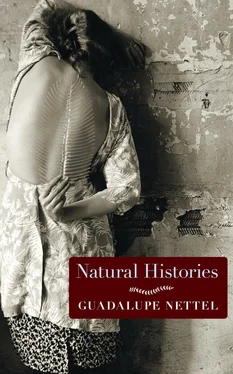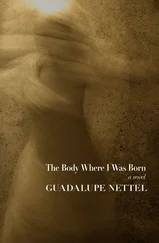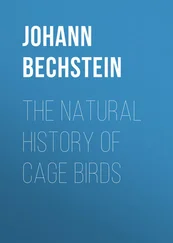Unlike us, the fish remained calm this entire time, not initiating any disputes. I was taking care of the aquarium those days. Heat as much as worry drew me from bed very early in the morning, before Lila and Vincent woke up, and I would begin circling my own container. One day, with no forewarning, not even a sign, I found the female floating on the top of the aquarium. Her fins were ripped and one eye was out of its socket. Her appearance left little room for doubt. She was dead. The male was also injured but he was still able to move among the algae at the bottom. Without a word I went over to the open window and pulled up the metal blinds to get some fresh air. The inside patio of our apartment looked like a rat’s nest. Below, a couple of students were packing their things into a moving truck. I don’t know how long I stood there, watching their movements and their excited faces. I didn’t hear the shower or the coffeepot that Vincent had turned on. I realized he was awake when he walked in front of me, heading out the door. When he saw I was crying he came over and kissed me on the cheek.
“I’m leaving,” he said. “I’m going to be late. We’ll talk about all this later”
When Lila turned three months old she was accepted into the day care on rue Saint Ambroise. She’d be there from eight in the morning until four-thirty. A true liberation. For her first day we both went to drop her off. On our way back we passed by the pet shop in République. I asked Vincent if we could stop and buy another Betta .
“It would have to be another male,” he said, “I hate the idea of replacing the female so soon. Besides, it wouldn’t be a bad thing if someone taught that brute a lesson.”
“Better to get one that’s phlegmatic instead of combative,” I said. “A fish with no initiative and indifferent to everything.”
We searched among the shop’s specimens and chose a red Betta with blue fins. We named him Oblomov in the hope that his name would have some positive influence on his temperament. I wondered about this resolve of ours, mine and Vincent’s, to keep buying Bettas . Why did we not, after that terrible ordeal, find a more amicable species? I suppose what we really wanted was a companion for our widower, not another animal that would be pointing out his faults, all that he was not nor could ever be because of his nature. We decided to leave the new one in a different fishbowl. We had heard that two male Bettas living in separate habitats from which they are able to see the other compete by displaying the full range of colors their genes allow them to develop. Oblomov seemed to flourish in his little container, but that was not the case for our widowed fish. Every day he got worse, and in two weeks he was found, just like his old mate, floating on the surface of the tank. After his death we dismantled the aquarium and brought it to the basement. To fill the empty space we returned to the bookshelf my many editions of The Civil Code , arranging them as they had been before.
Oblomov remained in his glass bowl, located once again in the little corner table in the living room. Neither Vincent nor I was interested in observing his development or behaviors. We fed him, unsystematically, from time to time. It was around then when I decided to leave and go to Bordeaux. I’d look for work, and when I found it I would move there and live with Lila in an apartment I imagined to be very spacious and not far from the city center. In the meantime I would live with my parents. I spoke to Vincent about it. He could come see Lila whenever he wanted. Perhaps, with the distance between us, things would work themselves out and he would decide to move there too. We said this and other lies I no longer remember. As we spoke, I kept looking over at the red fish circling his bowl, counterclockwise.
I finished packing up my books yesterday morning. Scatterbrained as I was, I included those from the library. I stuck my winter clothes in the metal trunk that had for many years served as a table in an even smaller apartment. In the afternoon, before picking Lila up from daycare, I looked over the books I was going to leave behind because it had never been clear whose they were. I went back and forth between my bedroom and the library countless times. Oblomov had died by the time I was finished. Nobody is surprised Vincent and I are separating. I realize it’s a catastrophe everyone saw coming, like the economic collapse of a small country or the death of someone terminally ill. We alone had clung for months to the possibility of a change we didn’t even know how to bring about, nor was it in our nature to see through. Nobody made us get married. No unknown hand grabbed us from our family aquariums and placed us in this apartment without our consent. We chose each other for reasons that, at least at the time, felt compelling. The reasons we are leaving each other are much less clear, but equally irrevocable.
I’ve been a biology professor at the Universidad de Valle de México for over ten years. I specialize in insects. Some people in my field of research have pointed out to me that when I’m in the laboratory or lecture hall I almost always keep to the corners of the room. It’s like when I’m walking along a street; I feel safer if I’m near a wall. Though I can’t explain exactly why, I’ve begun to think it’s a habit born of the depths of my nature. My fascination for insects emerged at a young age, when I was about eleven and passing from childhood into adolescence. My parents had recently split up, and as neither one of them was psychologically sound enough to be responsible for the mistake they had engendered together, they decided to send me to live with my mom’s older sister, my aunt Claudine, who had managed to build a functional family with two disciplined, tidy, and studious sons. I knew their house well. It was part of a middle-class housing complex with American dreams, as my dad would say. Very different from the place where I’d been born and had spent eleven long years. My house and my aunt’s were opposite in every way. We lived in a crumbling section of Colonia Roma, in one of those apartments known today as “lofts” and in those days as “artists studios.” Though it actually looked more like a photographer’s dark room, for the fabrics — from India, mostly — that kept the sun out; my mom suffered from constant migraines and couldn’t stand being exposed to light for very long. In contrast, my aunt and uncle’s house had enormous windows, and also a garden where my cousins played Ping-Pong. Whereas in our family all three of us shared household cleaning duty — a duty none of us ever really fulfilled — my aunt employed a kind and quiet maid who lived with her mother in a room up on the roof terrace. Isabel and Clemencia. Once I’d settled into my aunt’s house, those two women taught me more things than I’d learned in an entire year at school. Which wasn’t surprising, considering that my parents’ fighting and screaming had worked on me like a hole punch, perforating my brain. Any information that wasn’t indispensable to my survival, such as long division with decimals and mitosis and meiosis, filtered through the holes and became lost forever in oblivion.
I imagine with gratitude how strenuous it must have been for them to travel to my aunt’s house together that January morning. They didn’t even stay for the drink offered them, and that was something they never refused. They left my two suitcases in the foyer and made their goodbyes there. The night before, my dad had explained to me that he and my mom thought very differently about many subjects, such as my education. He also assured me that sooner or later things would work themselves out and I’d be able to move in with one of them and spend vacations with the other, like all the other kids with divorced parents at my school whom I’d been observing with curiosity, like you would the victim of a civil war, for some time. Mom didn’t say anything. I remember her that night, sitting on a pillow in her favorite position, her legs folded into a triangle and her chin resting on her knees. My parents did not expand upon that explanation on the way to the housing complex. They greeted my aunt and uncle without looking them in the eyes and ordered me, in front of them, to behave myself and do as I was told. After that, without even saying when they’d come for me or at least come visit, they got into the car and disappeared.
Читать дальше












